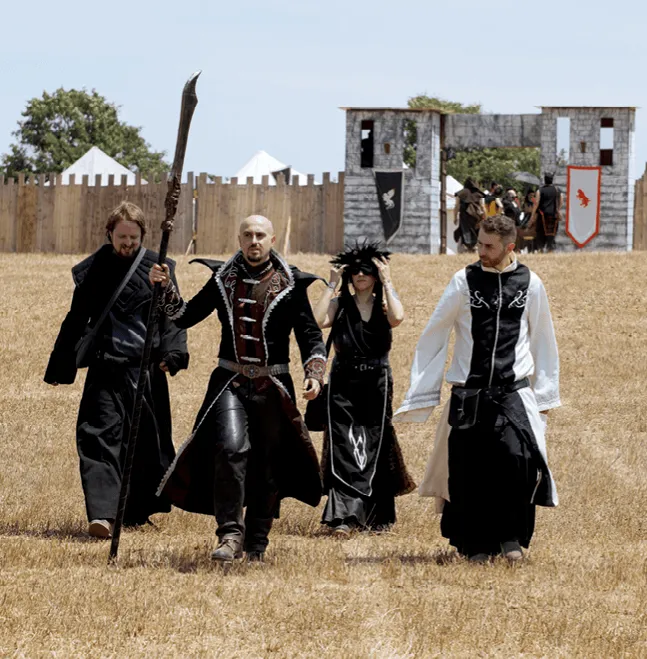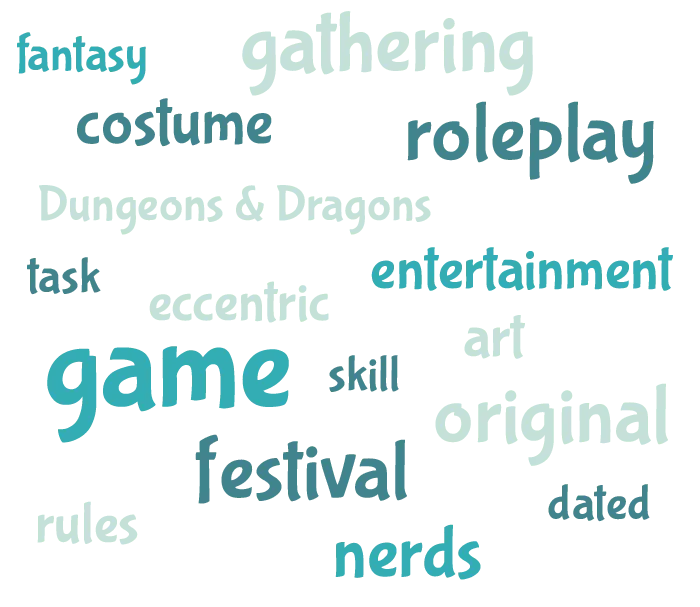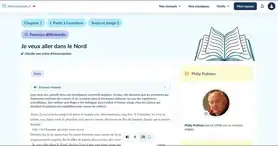Unit 8
Bac
Exam file
Préparation aux évaluations communes
Ressource affichée de l'autre côté.
Faites défiler pour voir la suite.
Faites défiler pour voir la suite.
Évaluations communes
1H30Ressource affichée de l'autre côté.
Faites défiler pour voir la suite.
Faites défiler pour voir la suite.
Compréhension de l'oral What Is LARPing?
1
Avant l'écoute, Lisez le titre ci-dessus et regardez le nuage de mots.a. Sur quoi peut porter cet enregistrement ? Faites trois hypothèses.
b. Trouvez cinq autres mots que vous pourriez entendre dans l'enregistrement.
2
Après l'écoute En rendant compte, en français, du , vous montrerez que vous avez compris les éléments suivants :
- Le thème principal du document ;
- À qui s'adresse le document ;
- Le déroulement des faits, la situation, les événements, les informations ;
- L'identité des personnes ou des personnages et, éventuellement, les liens entre elles / entre eux ;
- Les éventuels différents points de vue ;
- Les éventuels éléments implicites du document ;
- La fonction et la portée du document (relater, informer, convaincre, critiquer, dénoncer, etc.).
Ressource affichée de l'autre côté.
Faites défiler pour voir la suite.
Faites défiler pour voir la suite.


Ressource affichée de l'autre côté.
Faites défiler pour voir la suite.
Faites défiler pour voir la suite.


Ressource affichée de l'autre côté.
Faites défiler pour voir la suite.
Faites défiler pour voir la suite.
LARP: Crash Course Games #26 CrashCourse, 2016. (Timing: 00:00 to 00:30 and 03:49 to 04:59)
Ressource affichée de l'autre côté.
Faites défiler pour voir la suite.
Faites défiler pour voir la suite.
Compréhension de l'écrit
The fantasy genre is often characterized by a medieval time period or some
form of pre-19th-century Western culture. Kingdoms, dragons, and wizards are classic elements found in fantasy. There are many reasons the genre and the time period are constantly linked together. For the purpose of this article, I will focus on three common reasons that are often mentioned while discussing the popularity of Medieval Fantasy. The first is the influence of the existing rhetoric surrounding the medieval period, followed by using a technologically deprived setting to allow magic to flourish, and most significantly the influence of the “Godfather of Fantasy,” Tolkien. When speaking of the “medieval period,” I am referring to series which resemble, or have clearly been influenced by the medieval period, as well as the Renaissance period of Europe. As such, series with clear links to either of the two eras, even if not necessarily set at that time, will also be discussed throughout the article.
The Image of the Medieval Period
The first encounter that most people have with medieval times, or at least a time that feels medieval, is through fairy tales. Western mythologies, folklore, and the Brothers Grimm introduced us to fairy godmothers and wands, elves and dwarves, heroes and dragons at a young age. Modern fantasy books all extrapolate from these works to a certain extent. In addition, the medieval period has been constructed to appear as a place of adventure. There are countless stories of knights in shining armor going off to slay dragons. We also have rebels like Robin Hood, who stole from the rich to help the poor, or Arthur and his knights of the round table. The idea of a hero going on a quest does not originate in the medieval world, but these stories are romanticized to fit the “Dark Ages.
The term itself, the “Dark Ages” alludes to sorcery, curses and death. The influence of Christianity also contributed to fear of spirits, demons and plagues sent to punish sinners. As such, authors already have the necessary material to help them develop a system of magic, or their own religion. Additionally, in a time period where the Inquisition and the Crusades were legally-sanctioned events, they get to work with an ambivalent law system that can give their protagonist more liberty. The medieval period gives them free range to warp what we already know about the time period and make it epic. With the Middle Ages, we already have a basic idea of this era's politics and lifestyles but not to the extent that we can fully relate to the world. As such, an author can take an event like The Wars of the Roses, multiply the number of houses involved, then add Dragons, White Walkers and Children of the Forest to create the framework for A Song of Ice and Fire. The medieval period is a perfect setting for intermixing magic and religion because the setting works seamlessly together. Since the idea of magic was already fully ingrained in the period, it makes it easier to stretch out what is already known and turn it into gold. Additionally, one of the most common arguments used to explain why magic and the medieval period work so well together suggests that magic would be redundant in a world that is technologically advanced.
The Image of the Medieval Period
The first encounter that most people have with medieval times, or at least a time that feels medieval, is through fairy tales. Western mythologies, folklore, and the Brothers Grimm introduced us to fairy godmothers and wands, elves and dwarves, heroes and dragons at a young age. Modern fantasy books all extrapolate from these works to a certain extent. In addition, the medieval period has been constructed to appear as a place of adventure. There are countless stories of knights in shining armor going off to slay dragons. We also have rebels like Robin Hood, who stole from the rich to help the poor, or Arthur and his knights of the round table. The idea of a hero going on a quest does not originate in the medieval world, but these stories are romanticized to fit the “Dark Ages.
The term itself, the “Dark Ages” alludes to sorcery, curses and death. The influence of Christianity also contributed to fear of spirits, demons and plagues sent to punish sinners. As such, authors already have the necessary material to help them develop a system of magic, or their own religion. Additionally, in a time period where the Inquisition and the Crusades were legally-sanctioned events, they get to work with an ambivalent law system that can give their protagonist more liberty. The medieval period gives them free range to warp what we already know about the time period and make it epic. With the Middle Ages, we already have a basic idea of this era's politics and lifestyles but not to the extent that we can fully relate to the world. As such, an author can take an event like The Wars of the Roses, multiply the number of houses involved, then add Dragons, White Walkers and Children of the Forest to create the framework for A Song of Ice and Fire. The medieval period is a perfect setting for intermixing magic and religion because the setting works seamlessly together. Since the idea of magic was already fully ingrained in the period, it makes it easier to stretch out what is already known and turn it into gold. Additionally, one of the most common arguments used to explain why magic and the medieval period work so well together suggests that magic would be redundant in a world that is technologically advanced.
“Medieval Fantasy: A success and an Impasse”
Ressource affichée de l'autre côté.
Faites défiler pour voir la suite.
Faites défiler pour voir la suite.
Questions
a) What continent is usually the setting for medieval fantasy?
b) What are the three reasons given for the popularity of medieval fantasy? Rephrase them in your own words.
c) Why is fantasy fiction often set in the Middle Ages?
d) What types of mission do fantasy heroes typically carry out?
e) What influence did religion have?
f) Explain the sentence in bold letters.
g) What's the problem with technology and magic?
b) What are the three reasons given for the popularity of medieval fantasy? Rephrase them in your own words.
c) Why is fantasy fiction often set in the Middle Ages?
d) What types of mission do fantasy heroes typically carry out?
e) What influence did religion have?
f) Explain the sentence in bold letters.
g) What's the problem with technology and magic?
Ressource affichée de l'autre côté.
Faites défiler pour voir la suite.
Faites défiler pour voir la suite.
Expression écrite
Choisissez un sujet et répondez-y en anglais en 120 mots minimum.
Sujet A - Texte
You write another paragraph to add to the article. Focus on another specific topic (ex: the use of magic, the absence of technology...).
Sujet B - Texte - Vidéo
“[F]antasy is often the bare bones of history trussed up (= tied up), manipulated and maximised to become something powerfully entertaining.” – Helen Carr for HistoryExtra, 2019. Discuss this statement.
Sujet C - Vidéo
Post an article on your blog to share your reaction to LARP.
Ressource affichée de l'autre côté.
Faites défiler pour voir la suite.
Faites défiler pour voir la suite.
- Sujet A : Essayez d'imiter le style de l'article et d'aller dans la même direction. Cela implique que vous devez comprendre le point de vue de l'auteur.
- Assurez-vous de faire des allusions à ce que vous avez vu dans l'unité et d'utiliser des références pour soutenir vos arguments.
- Sujet C : Faites attention à votre ton. Vous pouvez utiliser l'humour.
Une erreur sur la page ? Une idée à proposer ?
Nos manuels sont collaboratifs, n'hésitez pas à nous en faire part.
j'ai une idée !
Oups, une coquille

